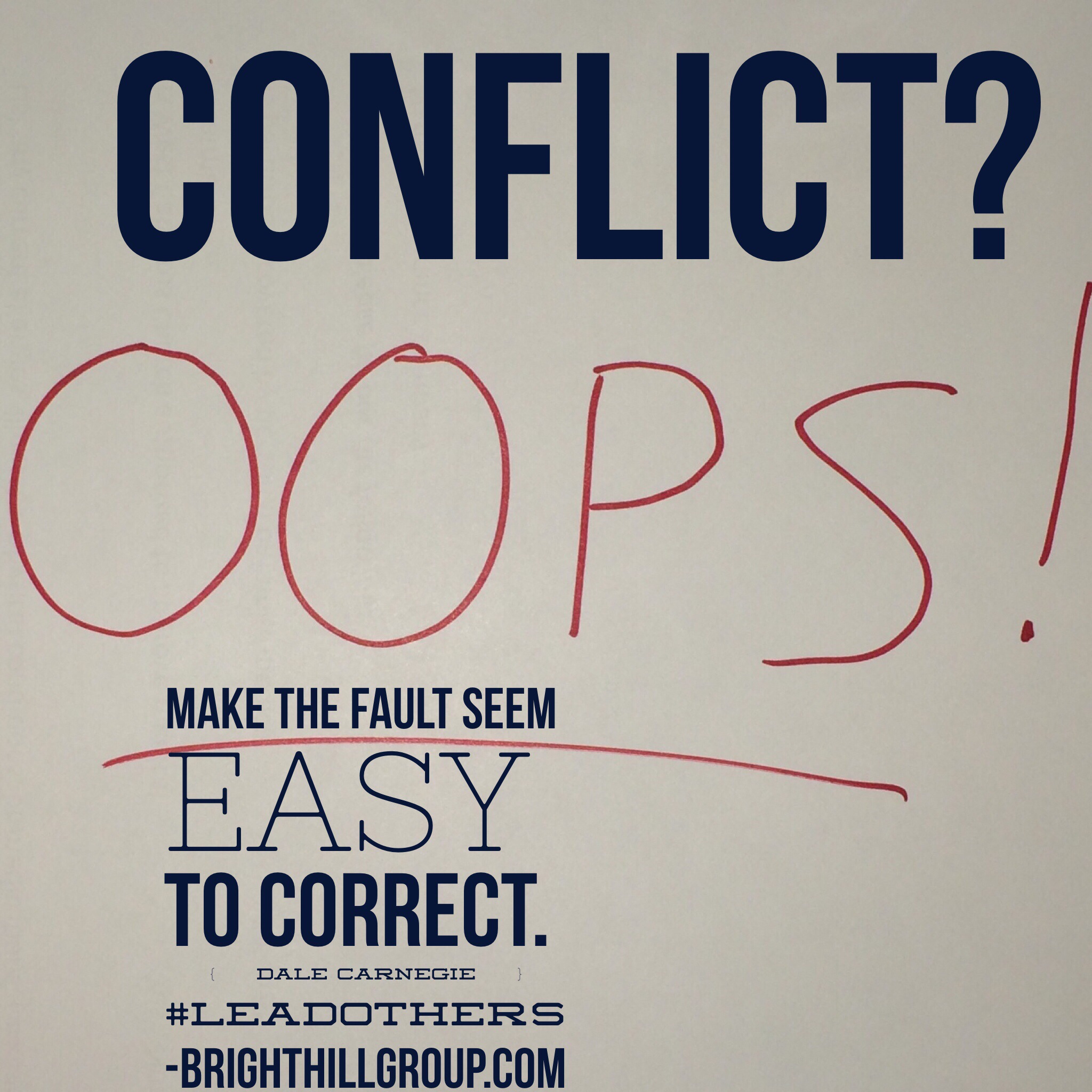Leader:
Have courage!
Trust your team to
do it right, and then
back them up
#LeadOthers
Conflict? Make it easy!
Conflict
Make the fault seem easy to correct.
Dale Carnegie
#LeadOthers
It’s not about the issue.
People never forget how you make them feel.
– Even if he is a jerk.
– Even if she is a “B” player.
– Especially if they don’t report to you.
Don’t make it out to be a big deal.
The relationship is more important than the issue.
Make it seem easy for them to fix it.
"These people make me crazy! Why won't they get off their butts and do the simplest thing?"
 The Outburst
The Outburst
We were sitting around the convergence room table during the sales pipeline meeting when suddenly Gary exploded in response to something Frank said.
You told Jack WHAT? What the hell were you thinking!?!?! Why did you tell Jack we could help them with that? We don’t even DO that!
The profanity-laced tirade went on for several minutes. The tension in the room built as Gary unpacked his frustrations on a stunned Frank.
At first, Frank attempted to sputter a response. This seemed only to fuel Gary’s anger. Cowed by the personal attacks, eventually Frank settled into sitting in silence, enduring the tongue lashing he “deserved” for doing something that Gary thought was stupid.
This was not the first time this had happened. I, too, had been the recipient of one of Gary’s attacks. It was awful. Every. Time. Awful for the target and for each of us around the table. Based on our experience, we recognized that the fastest way to bring it to a close was to sit down, shut up, and hang on.
After Gary unloaded, it was over for him, and he returned to work as if nothing unusual had happened.
Observations
- Conflict was seen as bad: Gary was not comfortable with conflict. He had expectations of people on his team. Of course, he did not consistently (or clearly) communicate those expectations to others.
- Since team members didn’t know what he wanted, they were unable to meet his expectations. They guessed, experimented, tried, and far too often they failed to do exactly what he would have done in that situation.
- Gary would notice that performance was not as he expected. He would be frustrated and begin to stew on the “failure.” This frustration would churn around and get bigger.
- Gary would confide in a team member that he was upset with the other team member. He would way “I don’t know why he did that. I was CRYSTAL CLEAR about what I wanted him to do.” (No, Gary was NOT crystal clear with others. Seriously.)
- He would continue to be frustrated about it until he hit his limit and he would “unload” on the person who “dropped the ball.”
- His demons exorcised, Gary felt better and could return to “normal.” He was “fine.”
- What about the team? We were left shell shocked. We could not predict when this might happen, or to whom. We walked on eggshells around him. All the time.
We could not be certain whether Gary would approve or reject our ideas, and we didn’t feel safe asking for his input because we could not predict whether he might unload on us. If we got great results, Gary was usually thrilled. (Sometimes he didn’t seem to notice or care.) If our results didn’t come – or didn’t come fast enough – he would sometimes be supportive, other times he would be furious. We could never tell what would happen.
Should I have had the moral courage to stand up to Gary? To tell him the truth? Perhaps. Should I have quit? Probably. Frankly I was afraid of him. He controlled my livelihood. If he wanted me gone I would immediately move to the ranks of the “unemployed.” My wife and kids depended on his whims.
As a result I rarely challenged him, rarely spoke up. I played it safe. So did almost everyone else. He didn’t see that. At all.
The really sick part was that Gary asked me over and over again why he could not motivate people to “get off their butts and take initiative.” He was sincere, but not ready to hear the answer.
He really saw no connection between his occasional eruptions and the impact on team members. It was a sad thing.
It was sadder still because at the core, Gary was a decent guy. He was passionate about his business and about his people. Gary really cared about team members as people, and it tore him up to see them struggling through personal issues.
Gary simply didn’t see the pain HE caused.
Does this ever happen in your workplace?
- Do you ever yell at your people?
- Does your boss ever “back up the truck and dump a load” on people to “drop the ball?”
- Do you ever wonder why people don’t take initiative or try new things?
This problem is solvable. Working together, we can help people begin to build a safe, productive, trustworthy environment. You’ll be amazed at how much faster work can get done. How much more innovation can happen.
Do your people make you nuts? Want to talk about it? Give me a call. If I can help, we can talk about next steps. No obligation, no sales pitch. Just a listening ear.
6 Ways To Make People Like You
“People do business with people they know, like, and trust”
Bob Burg
But how can you get people to LIKE you? Dale Carnegie collected a simple list and put it in his book How to Win Friends and Influence People.
Here’s a quick video to help you remember 6 simple ways to improve your likability.
Don’t miss out on the FORMula to be a great listener!
F: Family
O: Occupation
R: Recreation
M: Message or Mission
Which of these tips did you find the most helpful?
Employee Engagement – What's the secret?
In this wide ranging conversation I speak with Dr. Peter Bamberger, an expert in human relations, and we cover some powerful ideas to help increase engagement.
- How do you reduce the risk of giving employees autonomy?
- What can we do to design jobs that people actually like to do?
- What do business processes have to do with incredible leadership?
- Does money matter to technology folks?
- When is it a good thing to let a decent performer quit?
Want to know more? Contact me to request my Free Employee Engagement Report: “Turn Your ‘Renters’ Into ‘Owners’ – 6 Ways To Increase Employee Accountability.”
About Dr. Bamberger:
Dr. Peter Bamberger holds a PhD in Organizational Behavior and HR Management from Cornell University and is currently on the Faculty of Management at Tel Aviv University’s graduate school. He has written extensively on issues related to HR and performance management.
Peter A. Bamberger’s research focuses on peer relations and helping processes in the workplace, employee emotional wellbeing, and compensation strategy. Co-author of Human Resource Strategy (with Ilan Meshulam Sage, 2000) and Mutual Aid and Union Renewal (with Samuel Bacharach and William Sonnenstuhl ,Cornell Univ. Press, 2001), Bamberger has published over 70 referred journal articles in such journals as Administrative Science Quarterly, Academy of Management Journal, Academy of Management Review and Journal of Applied Psychology. He served as Associate Editor of the Academy of Management Journal from 2007-2010.




